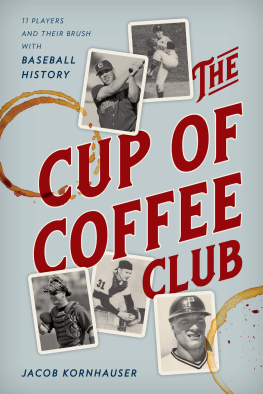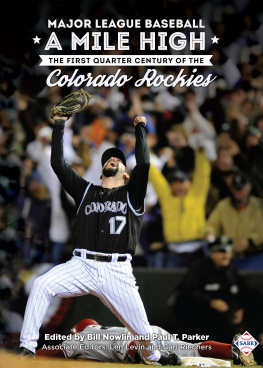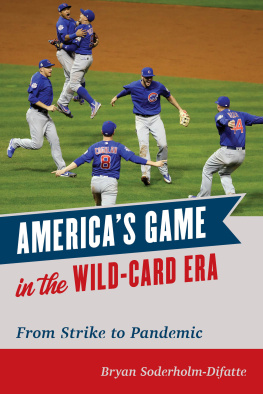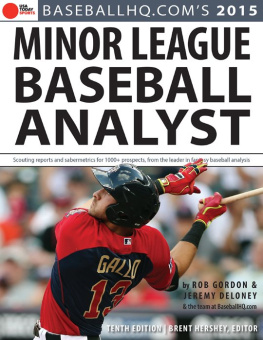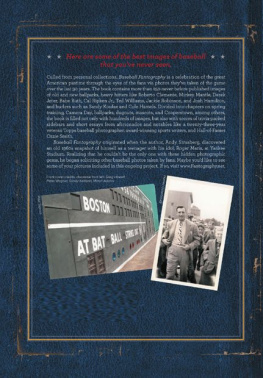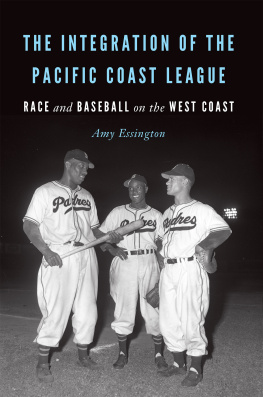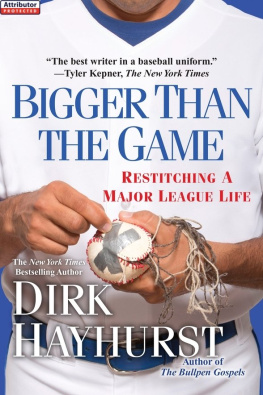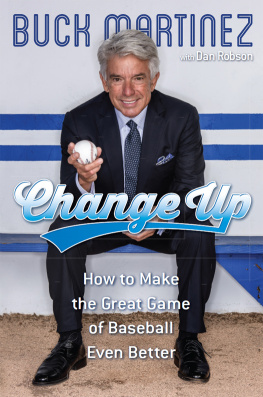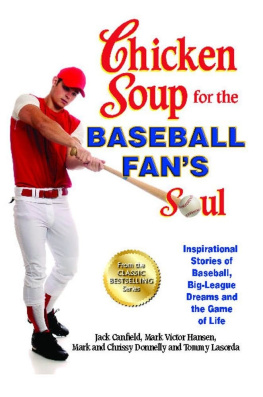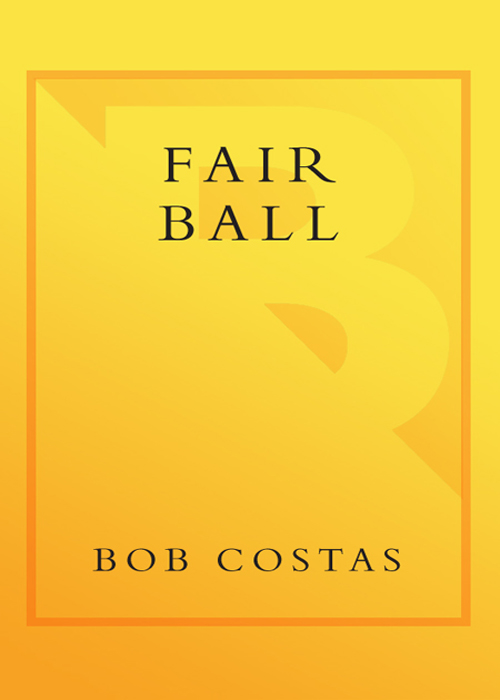
CONCLUSION
Where do we go from here?
Following the 2001 season, the owners and the players will have to hammer out a new contract.Can you imagine anything more excruciating than having to sit through the same tired posing and machinations that weve seen and heard so often in the past? While push is likely to come to shove between the 2001 and 2002 seasons, it is imperative that the owners come together well before that, spelling out their plan so that all parties may consider and debate it before the 11th hour.
Commissioner Bud Selig, given broad new powers early in 2000, must use these powers not merely to identify but to forge an unshakable consensus among the owners that significant revenue-sharing is essential. More piecemeal solutions like the luxury tax hammered out in 1995 would be disastrous. The revenue-sharing plan they arrive at must be not only far-reaching, but also tied to larger principles that will hold even as the dollar figures change in the years ahead.
No one should underestimate the practical difficulties involved, given baseballs historically acrimonious factions, not just between owners and players but among the owners themselves. And realistically, much of what has been proposed here would need to be phased in over a period of years.
But if hardball must be played, then play it. If it means that the Kansas Citys and Pittsburghs of the world tell the New Yorks that when they go on the road to the small-market stadiums, they wont be allowed to plug in their TV equipment, then so be it. If it means telling them that they can show up in spring training by themselves, because the vast majority of teams wont be there, thats fine, too. This is the time and place for them to draw the line.
By the same token, the rank and file of the Players Association needs to realize that the sacred cow of unlimited wages now only serves to slow overall salary growth and destabilize the entire game. They must stop viewing all suggestions that a dysfunctional system needs reform as an assault on their most basic rights. And theyve got to come together and recognize that only through payroll ceilings and floors will the general well-being of most players be served. Can a union really pass on substantial overall salary gains just so the top five percent of players can continue testing the boundaries of market sanity? Nows the time for them to take the high road, and contribute constructive thoughts toward a plan that makes sense for a majority of players and stabilizes the economics of the game.
Do I think these things will happen? Maybe not, given the history of bumbling and duplicity on one side and intransigence on the other. But this much is undeniable: We have arrived at a time when a majority of owners and a majority of players have something in common: a strong incentive to correct the overall system, before it prices even more teams out of contention and, in the process, consigns even more players to the netherworld of those teams rosters. Or, worse still, forces some teams out of business entirely, taking those big-league jobs with them.
So heres hoping that common sense will prevail. In the past two years, weve seen the NBA come to its senses and realizeeven though the league was ostensibly healthywhere things were headed. The owners decided to slam on the brakes before driving off the cliff. They shut their game down, not in the purposeless way in which baseball burned its World Series of 1994, but with a clear, tough vision of what the sport should be as well as what it would become if they did not act decisively. Throughout much of the 9899 NBA lockout, the following was heard from all sectors of the media and fans: Didnt they learn anything from baseball?
But as I said at the time, those observers had the question exactly backward. The question should have been and now is, What has baseball learned from basketball? Are the vast majority of clubs who cannot continue under this system willing to be tough enough and farsighted enough to do what is necessary to set it straight?
I hope so. They need to be willing to shut the game down again, if necessary, until the big-market high-rollers among the owners and the idealogues among the players see that there simply will not be any baseball played until a workable economic system is in place. When the NBA showed the brains and resolve to go that route, some pundits claimed that the basketball playerswhose union was neither as strong nor as capably directed as the baseball playershad merely capitulated. And yet the salaries of average players went up almost immediately, as did the pay of journeyman benchwarmers. The sole negative consequence to the players is that Stephon Marbury and Keith Van Horn must scrape by on about $10 million per year instead of $15 million.
The fact is that if the owners play their hand right, the biggest difference between the basketball situation and what should happen in baseball is simply how long it will likely take before the players see that the owners have their act together and mean business.
It will be a long, hard road. But it has to be taken. The responsibility for change ultimately falls on the owners. They are the caretakers of the game. They are the ones who must take the lead in reshaping it. And they are the ones who will be blamed if the next work stoppage doesnt bring about meaningful and lasting changes.
And what about the fans? They need to do what the owners and players have so often been incapable of doing: See the big picture, knowing that if this plays out as it might, sacrificing some or even all of the 2002 season will be well worth it if baseball finally establishes some equilibrium.
We can at least hope that, in this age of instant gratification, baseball will awaken to the idea that some things that may cost a bit of revenue in the short term are actually an investment in the games popularity and prosperity in the long-term. Players and owners alike need to be less willing to sacrifice the games essence on the altar of commercialism.
If they come to this realization, they will have our gratitude, our respect, and our continued support. And I promise you that all those involved will be richer in the long run.
AFTERWORD
The 2000 baseball season ended as the one before it hadwith the jubilant New York Yankees celebrating in their clubhouse, George Steinbrenner commending Joe Torre on the fine job he did in handling the pressures of repeating, and the talk of dynasty in the air. Come the off-season, the Yankees reloaded again, snatching Mike Mussina, the top pitcher on the free-agent market.
One can respect and admire the Yankees resiliency, professionalism, and effective use of their overwhelming resources and still not lose sight of the bigger picture, as some apparently have. In the aftermath of the teams fourth title in five years, one postgame commentator actually said that the latest run by the Bronx Bombers is all the more amazing because dynasties are harder to achieve in the free-agency era. This statement was true in the free-agency years prior to the 199495 strike (when only one team repeated over a 15-year stretch and multiple teams from every market and revenue level were represented among the winners and contenders). But it has been patently untrue since the strike, when all six titles have been won by teams with payrolls among the top five in baseball, and 10 of the 12 World Series participants have been among the top five (even the other two were seventh and tenth).
Theres something worth clarifying here: While the Yankees recent World Series wins and ever-increasing revenue and payroll advantages have served to crystallize baseballs competitive imbalance crisis, the real problem is not that the Yankees have won so often, but that so many other teams have no reasonable chance to win at all. So even if the Yankees had been tripped up in a playoff or World Series now and then, youd have a different world champion but not a different essential conclusion.
Next page

